AI Rank Tracker: Boost Your Brand Visibility in ChatGPT, Gemini, Perplexity & More — Now Available 🚀
AI Rank Tracker: Boost Your Brand Visibility in ChatGPT, Gemini, Perplexity & More — Now Available 🚀
SEO agencies know that staying ahead of keyword trends is key to keeping clients competitive in search rankings. By spotting emerging search patterns early, your agency can help clients capture high-intent traffic before competitors.
For instance, if searches for “AI SEO tools” start rising, you can proactively build content clusters, update client blogs, or fine-tune PPC campaigns to capitalize on the trend.
However, with trending keywords changing daily, identifying the right opportunities at the right time can be challenging. To help, we’ve outlined the most effective ways to monitor keyword trends without overspending on tools or getting lost in data overload.
As the name implies, keyword tracking allows you to monitor search queries and discover new keyword suggestions that you can target for better search visibility and traffic.
You can set up keyword tracking with keyword.com in only a few steps:
Step 1: Log into your keyword.com dashboard. Enter your URL, then list the keywords you’ll like to track.
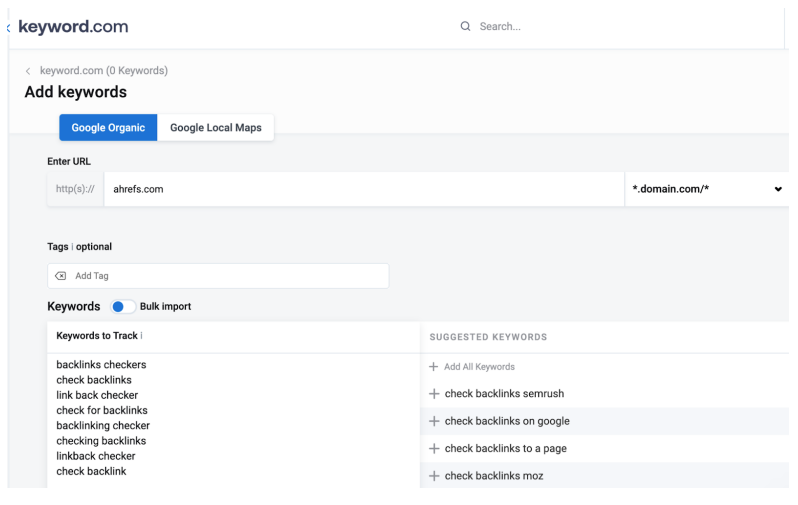
Step 2: Set the data parameters for granular keyword tracking. You can specify the location, device (whether mobile or desktop), and other information. Next, click “Add keywords.”
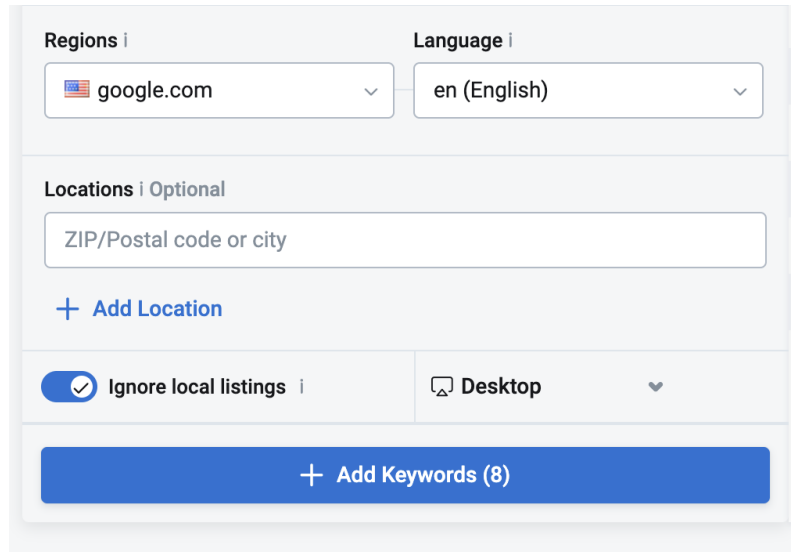
Step 3: Here, you will see your SERP performance for those keywords over time and uncover trends or patterns. Keyword.com also shows you its current SERP ranking, competition, and search volume for these queries.
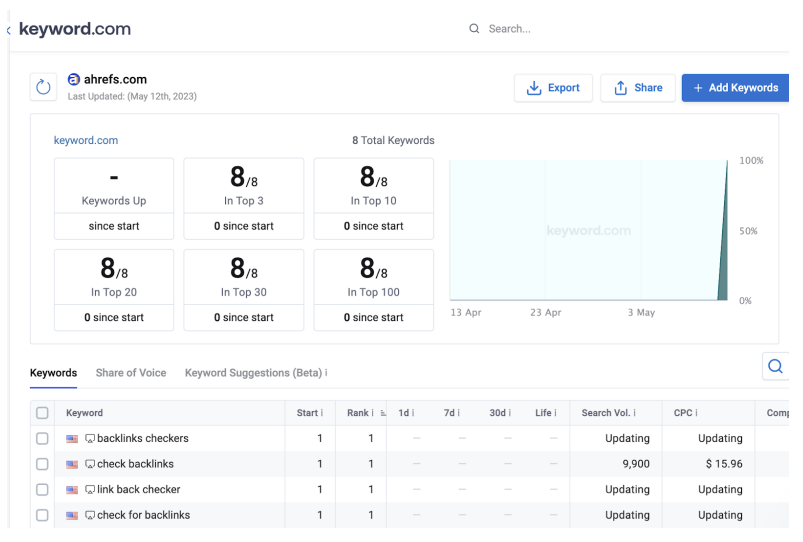
What you’ll uncover with keyword tracking:
Tip: Set up automated reports to receive keyword insights in your inbox daily, weekly, or monthly.
Google Trends helps you analyze keyword popularity over time, making it a valuable tool for identifying new keywords.
How to use Google Trends effectively:
An excellent example of a rising keyword is the search query “AI SEO,” which has gained significant traction over the past two years.
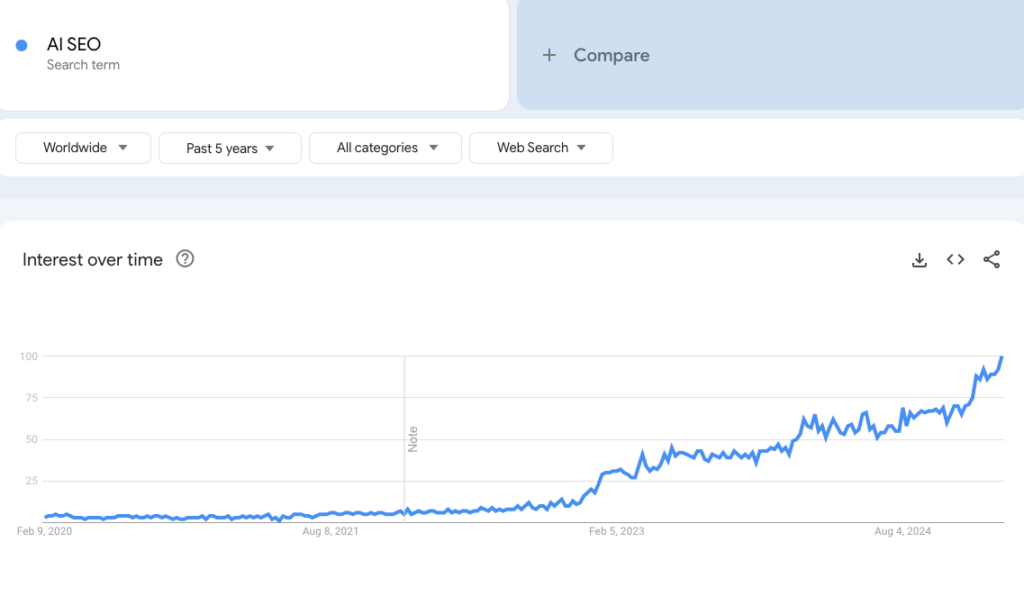
Tip: If Google Trends shows a seasonal spike in searches for your product, plan your campaigns and content accordingly to capitalize on this interest.
Social media platforms often serve as early indicators of trending topics before they appear in search engines. Platforms like TikTok, X (formerly Twitter), and Instagram Reels are especially useful for spotting emerging industry conversations.
How to track keyword trends on social media:
Posts with high engagement (shares, comments, and saves) often indicate rising interest in a topic, making them strong candidates for SEO optimization.
Tip: Monitor viral topics in your niche and create content around them before they peak in search engines.
Analyzing your competitors’ keyword strategies can help you discover content gaps and new ranking opportunities.
Tools for competitor keyword analysis:
If a competitor is ranking for “best AI-powered SEO tools,” but you haven’t covered that topic, this presents an opportunity to create optimized content and attract similar traffic.
Tip: Check out our “How to Track Your Competitors’ Keywords” guide to get started.
Reading top industry blogs helps you stay informed about new topics, trends, and keyword opportunities.
If multiple top blogs start covering a specific subject, it’s a sign that the topic is gaining relevance. Look at headlines and subheadings, as these are often optimized for search. Also, review the comments section—audience questions can inspire long-tail keyword ideas.
Tools to streamline industry blog research:
Tip: Subscribe to SEO newsletters to be the first to know about newly published blogs from thought leaders in the industry.
Google Alerts is a free tool for monitoring the web for mentions of your brand, products, or industry-related keywords. You can set up alerts for specific keywords and receive notifications whenever they’re mentioned on the web.
To make the most of Google Alerts:
Tip: Set an alert for your brand name to be notified whenever you’re mentioned online.
Sites like Reddit and Quora are excellent resources for analyzing real-time conversations in your industry.
As an SEO agency, a good starting point would be r/SEO and r/TechSEO. Many founders join these communities, seeking answers that can be provided through content creation.
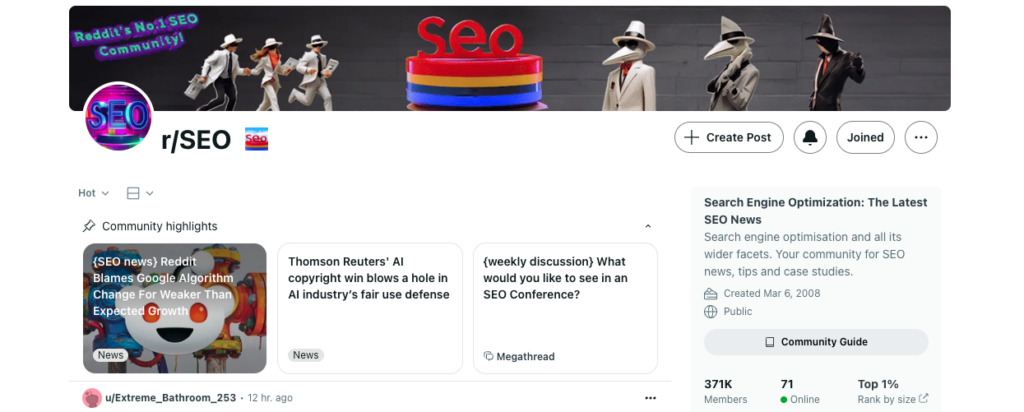
You can also track common questions by searching threads for queries in your industry and looking for long-tail keywords. Pay attention to threads with many upvotes as they indicate popular topics and potential keywords.
Tip: Use this guide to help you research topics for forums like Reddit and Quora.
Google Analytics and Google Search Console provide data on how visitors find your website and which keywords they use.
Key insights from web analytics:
Tip: Combine web analytics with heatmaps (like Hotjar) to see how users interact with keyword-driven pages.
Customer feedback is an overlooked but powerful keyword research tool. Reviews, support interactions, and surveys reveal how customers describe their pain points, helping you discover new keyword opportunities.
Best ways to collect keyword-rich feedback:
Tip: Turn customer questions into FAQ content optimized for search.
With 47% of global internet users accessing YouTube monthly, video trends offer keyword insights that can fuel your SEO strategy.
How to find keyword opportunities on YouTube:
Tip: Use YouTube SEO insights to create blog posts and video content targeting the same trending keywords.
The rise of voice assistants such as Siri, Alexa, and Google Assistant is changing how people search online as voice searches are more conversational.
To identify common voice search queries, you can use tools like AnswerThePublic, which reveal the questions people are asking, particularly those that start with “who,” “what,” “how,” and “where.”
Tip: Use our Voice Search Guide to help your clients use more natural language and long tail keywords to address voice search queries.
Surveys and polls show your audience you’re interested in their opinion and help you find new keyword ideas and trends.
Use platforms like SurveyMonkey, Typeform, or social media polls to gather insights on:
Tip: A survey might show that your audience wants to understand “emerging AI content trends,” helping you discover a new content avenue.
If you’re an SEO agency wanting to stay on top of all the new trending keywords, book a demo with Keyword.com to help your clients stay relevant.